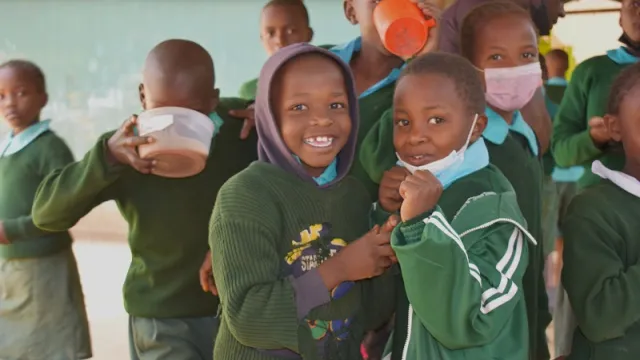The man fighting hunger in schools one Cup of Uji at a time

The man fighting hunger in schools one Cup of Uji at a time
Since Kenya gained independence 59 years ago, the goal of having no child going hungry in school is yet to be fully achieved largely due to poverty.
Every day, thousands of children around the country go to school hungry, which affects their ability to concentrate and learn.
Different initiatives started by various players in the education system eventually run out of steam, leaving many children even more vulnerable.
Quite often, these students are forced to drop out of school, further plunging their families into poverty and hopelessness.
Studies have shown that one of the best solutions to this dire situation is to offer the students daily hot meals in school as this goes a long way in boosting learning and improving performance.
Providing learners with a hot meal becomes an incentive for parents to send their children to school. This then directly contributes to Kenya’s Vision 2030 and to the Sustainable Development Goals of providing quality education and zero hunger.
In some early childhood development centres, county governments provide support to ensure that children receive one nutritious meal a day. However, the hope of thousands of hungry learners should not only depend on the government and international donors.
Take Francis Otieno Amonde for instance. A visit to see his mother, then a teacher at Nyatwere Primary School in Oyugis, Homa Bay County, in 2011 saw him resolve to extend a helping hand to dozens of learners in the school's kindergarten by providing them with a nutritious, warm cup of uji every day.
Read aslo: As interest rates remain low, banks are finding new areas of investments
“I couldn’t stand the thought of these children going hungry and so I decided to do something about it," said Francis, founder Cup of Uji campaign.
A majority of the school children either had one parent or were orphans. Most of them were living with their grandparents who were unable to provide them with three meals a day, Francis explained.
"I decided to tweet the President at 1am to inform him about my Cup of Uji idea, its goals and our urgent need to scale it. A communications official from the Office of the President reached out to me and helped me to create awareness via #CupofUji campaign," he said.

The online campaign helped us to start scaling the programme and cover more schools across Kenya, he noted.
Through donations from both individuals and corporates, Francis has been able to expand the project to serve over 5,000 pupils across Kenya currently.
At the moment, six schools in five counties are benefitting from Francis' initiative: A cup of warm uji on school days.
Test results show that the performance of learners in Nyatwere Primary School and Kasimba Primary School (Homa Bay County), Tandia Primary School (Kilifi County), Kumpa Holy Mothers Primary School (Kajiado County), Kositot Primary School (West Pokot County), Kawangware Primary School (Nairobi County) is improving according to Francis who is a Rotarian.
"All the schools have about 5,443 students. We often encourage companies to partner with us to buy key supplies such as porridge flour, sugar and even funds. We also ask partner companies to allow their employees to come join us in serving uji and interacting with the students," he said.
The campaign has seen an increase in enrolment numbers and the learners’ performance has improved. Francis has also started a scholarship fund to pay school fees for a number of students in secondary school and university.
The Cup of Uji feeding programme has also seen a rise in the number of children participating in sports.
Francis banks on the spirit of lifting one another by working with a team of 30 volunteers, while also leveraging on the power of social media platforms such as Facebook, Twitter, Instagram, and LinkedIn to create awareness and raise funds for the campaign.
As he sets his sights on feeding 100,000 learners in the country's schools, Francis remains open to partnerships with corporates and individuals in the spirit of Kenyans lifting one another for a good cause.
"We want to have kitchens that use clean energy as well as a farm to grow some of our key ingredients such as groundnuts and arrow roots," he said.

Globally, charity initiatives compliment public services in health care, education, fighting poverty, and child protection, all of which Francis believes are core to the mission of his novel idea - the Cup of Uji programme.
"It's the little things we do that change lives and so I encourage all Kenyans to embrace the spirit of lifting one another up to help those in dire need," said Francis, who is an ambassador of Safaricom’s Tuinuane spirit.
As high food prices hit families and school feeding programmes like Cup of Uji hard, Francis is planning to set up an endowment fund in order to generate revenue and guarantee meals for children until they finish school.
The effects of the school meal programme on the well-being and success of Kenyan children cannot be overstated.
In order to ensure the success of Free Primary Education, there is a need for consistent investment in programmes such as Cup of Uji, which increase access and participation in education, and boost the quality of learning.



